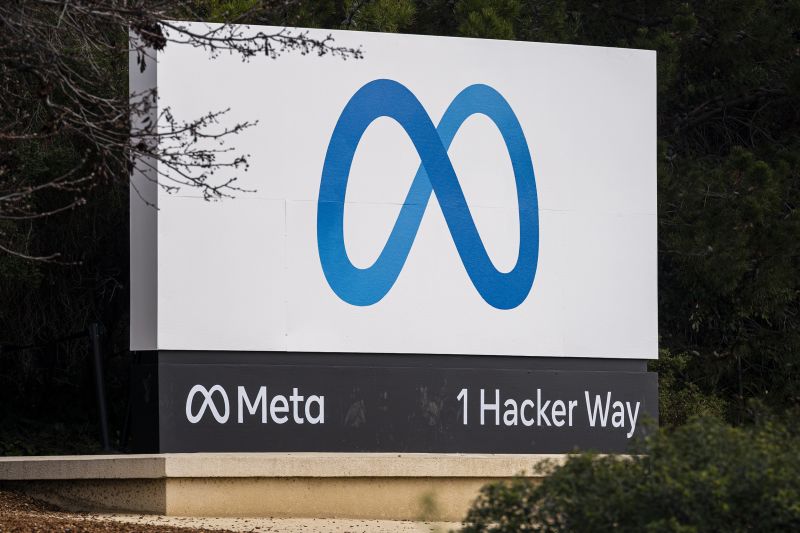

New York
CNN Business
—
Facebook parent company Meta announced Tuesday it had detected and shut down two separate networks of fake accounts engaged in covert influence operations run from China and Russia.
The Chinese network was small and received barely any attention, but it did include some accounts that posed as Americans on both sides of the political spectrum, according to a Meta report released Tuesday. Meta publicly detailed the takedown as it remains on high alert for foreign interference in the US midterm elections, a Meta spokesperson told CNN. Ben Nimmo, Meta’s global threat intelligence lead, told CNN it was the first time the company had seen Chinese accounts targeting Americans in this way. “They were running fake accounts that pretended to be Americans and try to talk like Americans and they were talking about really divisive domestic issues like abortion and gun control,” he said.
The company has shared details of the Chinese accounts with the FBI, a Meta spokesperson said.
The Russian campaign, on the other hand, was vast. It pushed pro-Kremlin narratives about the war in Ukraine, included thousands of accounts and pages across multiple social media platforms and spent more than $100,000 on ads on Facebook and Instagram.
Meta did not attribute either campaign to specific entities within China or Russia, or to the Chinese and Russian governments, instead saying only the accounts that were part of the campaigns were run out of the respective countries.
Meta said the network of Russian accounts it had taken down was the “largest and most complex Russian operation we’ve disrupted since the war in Ukraine began, it ran a sprawling network of over 60 websites impersonating news organizations, as well as accounts on Facebook, Instagram, YouTube, Telegram, Twitter,” and other sites, according to the report.
More than 2,000 Facebook accounts and pages were part of the effort to push pro-Kremlin narratives about the war in Ukraine, Meta said. More than $100,000 were spent on ads across Facebook and Instagram as part of the campaign, Meta said.
The operation included websites that were designed to mimic real Western news outlets, including The Guardian. According to a list of website addresses included in the Meta report, the Russian campaign also registered fake sites designed to look like The Daily Mail and the German outlets Bild and Der Spiegel.
The sophistication of the effort was demonstrated in its attempts to promote disinformation about the Bucha massacre.
Meta noted Tuesday, “the website mimicking The Guardian posted an article that accused Ukraine of staging the murder of civilians during the Russian occupation of Bucha,” according to the report.
“The mimicry was not perfect,” Meta noted, “but it showed investment into making the site appear authentic so it could withstand at least some casual scrutiny.”
The Chinese effort only consisted of about 80 Facebook accounts and barely had any following. Meta said the accounts primarily targeted audiences in the United States and the Czech Republic but posted during working hours in Beijing.
Meta said, “these accounts largely stuck to a shift pattern that coincided with a nine-to-five, Monday-to-Friday work schedule during working hours in China — 12 hours ahead of Florida and six hours ahead of Prague,” according to the report.
Some of the accounts posed as conservative Americans, while others posed as liberals living in Florida, Texas, and California, according to Meta.
The accounts posted comments on some American news stories that appear to be designed to stoke debate online.
Despite getting little traction online, Meta noted the significance of the network in its report. “This was the first Chinese network we disrupted that focused on US domestic politics ahead of the midterm elections,” Meta said. “Chinese influence operations that we’ve disrupted before typically focused on criticizing the United States to international audiences, rather than primarily targeting domestic audiences in the US.”
Meta’s Ben Nimmo told CNN, “this was a small operation and it didn’t seem to build any meaningful audience but it’s the first time that we’ve seen an operation from China like this really focusing on targeting U.S. political debates and we’re all on high alert ahead of the midterms.”
“We know that even small operations these days work across lots of different social media platforms. So the more we can share information about it, the more we can tell people how this is happening, the more we can all raise our defenses,” he said in an interview with CNN Monday night.
CNN has reached out to the FBI, Twitter, Telegram, and YouTube for comment.
